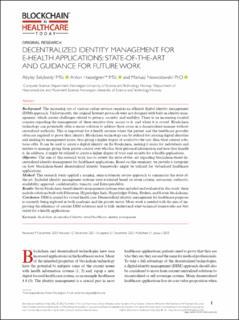| dc.description.abstract | Background: The increasing usage of various online services requires an efficient digital identity management approach. Unfortunately, the original Internet protocols were not designed with built-in identity management, which creates challenges related to privacy, security, and usability. Thereis an increasing concern regarding the management of these sensitive data in the society, who have access to it and where it is stored. Blockchain technology can, potentially offer a secure solution to address this problem, in a decentralized manner without any centralized authority. This is of importance for e-health services where the patient and the healthcare provider often are required toprove their identity. Blockchain technology can be utilized for creating digital identities and make themanagement of those identities easier, giving a higher degree of control to the user than what current solutions offer. It can be used for creating a digital identity on the blockchain, making it easier to manage for individuals and entities, giving them greater control over who has their personal in-formation and how they handle it, and it could be utilized to create a higher degree of trust andsecurity to e-health applications.
Objective The aim of this research work is to review the state-of-the- art regarding blockchain-based decentralized identity management for healthcare applications. Based on this summary, we provide a viewpoint on how blockchain-based decentralized identity frameworks couldbe utilized for virtualized healthcare applications.
Method This research has applied a scoping, semi-systematic review approach to summarize thestate-of-the-art. Included identity management systems were evaluated based on seven criteria:Autonomy, Authority, Availability, Approval, Confidentiality, Tenacity and Interoperability ResultsSeven blockchain-based identity management systems were included and evaluated in this work:These include solutions built with Ethereum, Hyperledger Indy, Hyperledger Fabric, Hedera andSovrin blockchains.
Conclusion Digital identity management is crucial for virtual healthcare. Decentralized identity management for healthcare purposes is currently being explored, both in academia and the private sector. More work is needed with the aim to improve the efficiency of current DIM solutions and to fully understand what technical frameworks are best suited for e-health applications. | en_US |

